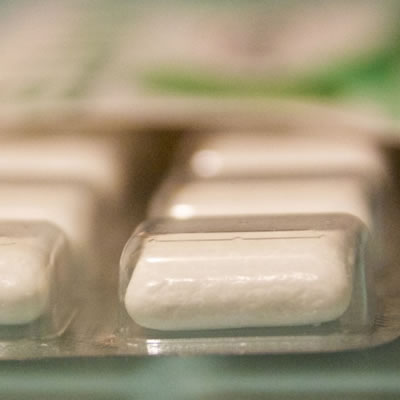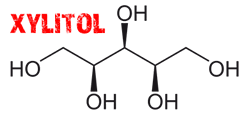Research has shown that the use of xylitol helps repair damage to the enamel. Saliva in itself protects the mouth and teeth. Stimulated saliva in particular contains all the components needed to repair early cavities. Saliva that has xylitol is more alkaline than saliva stimulated by other sugar products. After taking xylitol, the concentration of basic amino acids and ammonia in saliva and plaque may rise (becoming less acidic), and plaque pH rises as well. When pH is above 7, calcium and phosphate salts in saliva start to move into those parts of enamel that are weak. Therefore, soft, calcium-deficient enamel sites begin to harden again.
Xylitol
Switch your chewing gum, mints, toothpaste and mouthwash now!!!!
Five exposures to xylitol each day will reduce plaque as effectively as brushing your teeth. Xylitol is a natural sugar alcohol and not an artificial sweetener. It looks and tastes like “table sugar,” but contains only 40% fewer calories than other carbohydrates. It has a low glycemic index of 7 with no insulin release. Xylitol reduces the levels of mutans streptococci (MS) in plaque and saliva by disrupting their energy production processes, leading to bacterial cell death. It reduces the adhesion of these microorganisms to the teeth surface and also reduces their acid production potential. Optimal inhibition of S. mutans growth by xylitol occurs with its total daily consumption of 5–6 g at a frequency of three or more times per day. It's the frequency that matters, using a xylitol product (toothpaste, mouthwash, chewing gum or candy) 5-7 times a day is best
When you eat food containing ordinary sugar (sucrose), it feeds the bacteria on your teeth, allowing them to multiply and start making acids that can eat away the enamel on the teeth. This “acid attack” causes tooth decay and cavities to begin to form. The bacteria in the mouth that are causing cavities are unable to digest xylitol, so their growth is greatly reduced. The number of acid-producing bacteria may fall as much as 90%. No acid is formed because the pH of saliva and plaque does not fall. After taking xylitol, the bacteria do not stick well on the surface of the teeth and as a result, the amount of plaque decreases.
Xylitol is a natural sweetener derived from the fibrous parts of plants. It does not break down like sugar and can help keep a neutral pH level in the mouth. Xylitol also prevents bacteria from sticking to the teeth. This is how it protects the teeth from tooth decay. With the dental benefits of Xylitol, the acid attack that would otherwise last for over half an hour is stopped.
One major study demonstrated that the intake of xylitol did not cause problems with lipogenesis (fat making), in fact it suppressed high-fat induced visceral fat accumulation. A balance of positive effects suggest that xylitol intake may be useful to control or prevent obesity, diabetes, and other metabolic disorders.
Xylitol can inhibit the growth of harmful oral bacteria, but it has been shown to impact growth of nasopharyngeal bacteria such as S. pneumonia and S. mitis, and hence has a role to play in nasopharyngeal pneumonia.
- Many xylitol products are junk because they contain minimal amounts of xylitol and have added sugars.
- Choose a xylitol toothpaste that is non-fluorinated and 100% xylitol.
- Choose a xylitol mouthwash that is non-fluorinated and 100% xylitol.
- Choose gum and mints that are sweetened with 100% xylitol.
- You can put granulated xylitol into your tea and coffee.
- Use xylitol as a baking substitute for brown sugar simply by adding 1 to 2 tsps of molasses for every cup of xylitol used. Xylitol does not carmelize or reach “hard crack” because it remains stable under high heat.


